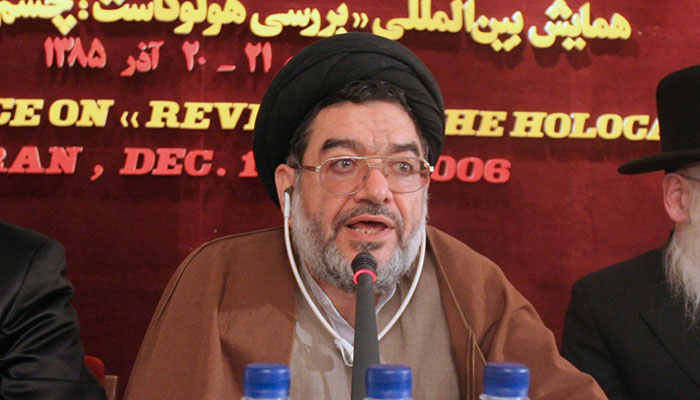Iran cleric who founded Hezbollah dies of Covid-19
TEHRAN/NEW DELHI: Ali Akbar Mohtashamipour, a Shia cleric, who as Iran's ambassador to Syria, helped found Hezbollah and lost his right hand to a book bombing reportedly carried out by Israel, died on Monday of the coronavirus. He was 74.
A close ally of Iran's late Supreme Leader Ayatollah Ruhollah Khomeini, Mohtashamipour formed alliances with Muslim militant groups across the Mideast in the 1970s. After the Islamic Revolution, he helped found the paramilitary Revolutionary Guard in Iran and as ambassador to Syria, brought the force into the region to help form Hezbollah, reported international media.
In his later years, he slowly joined the cause of reformists in Iran, hoping to change the Islamic Republic's theocracy from the inside. He backed the opposition leaders Mir Hossein Mousavi and Mahdi Karroubi in Iran’s Green Movement protests that followed the disputed 2009 re-election of then-President Mahmoud Ahmadinejad.
"If the whole people become aware, avoid violent measures and continue their civil confrontation with that, they will win,” Mohtashamipour said at the time, though Ahmadinejad would ultimately remain in office. “No power can stand up to peoples will."”
Mohtashamipour died at a hospital in northern Tehran after contracting the virus, the state-run IRNA news agency reported. The cleric had been living in the Shia holy city of Najaf, Iraq, over the last 10 years after the disputed election in Iran.
Meanwhile, India on Monday reported just over 100,000 fresh infections -- after several days of 400,000-plus cases in May — and nearly 2,500 deaths. The health ministry said total deaths were just under 347,000 so far, although experts warn the actual toll could be much higher and there have been claims of undercounting.
India has administered just under 233 million vaccine shots against COVID-19 so far, but experts say the mass inoculation drive needs to be stepped up to combat the spread of the virus in the nation of 1.3 billion people.
New Delhi and financial hub Mumbai began a gradual easing of restrictions on Monday as coronavirus infections in the country fell to a two-month low.
Hospitals in the cities -- which have a combined population of some 40 million -- were overwhelmed by a deadly COVID-19 wave in April and May, with severe shortages of oxygen and other critical medicines.
The city´s metro services were operating at 50 percent capacity and roads quickly filled up with vehicles, but local shopping areas remained quiet. The northern city was reporting an average of 25,000 daily cases during its peak. It fell to 381 infections on Sunday, officials said.
The Hotel and Restaurant Association of Western India estimated that more than two million jobs were lost during the Maharashtra lockdown. "We are very happy to open our doors again today," the restaurant manager of the Mumbai branch of popular eatery Social, who gave his name as Malay, told AFP.
Experts warn that while the crisis has eased in Delhi, Mumbai and other major cities, the disease is still spreading in rural areas and in some southern and northeastern states. The death toll — which usually lags infection figures by several weeks —was still at elevated levels, they added.
-
 'The Muppet Show' Star Miss Piggy Gives Fans THIS Advice
'The Muppet Show' Star Miss Piggy Gives Fans THIS Advice -
 Sarah Ferguson Concerned For Princess Eugenie, Beatrice Amid Epstein Scandal
Sarah Ferguson Concerned For Princess Eugenie, Beatrice Amid Epstein Scandal -
 Uber Enters Seven New European Markets In Major Food-delivery Expansion
Uber Enters Seven New European Markets In Major Food-delivery Expansion -
 Hollywood Fights Back Against Super-realistic AI Video Tool
Hollywood Fights Back Against Super-realistic AI Video Tool -
 Meghan Markle's Father Shares Fresh Health Update
Meghan Markle's Father Shares Fresh Health Update -
 Pentagon Threatens To Cut Ties With Anthropic Over AI Safeguards Dispute
Pentagon Threatens To Cut Ties With Anthropic Over AI Safeguards Dispute -
 Samsung Galaxy Unpacked 2026: What To Expect On February 25
Samsung Galaxy Unpacked 2026: What To Expect On February 25 -
 Travis Kelce Takes Hilarious Jab At Taylor Swift In Valentine’s Day Post
Travis Kelce Takes Hilarious Jab At Taylor Swift In Valentine’s Day Post -
 NASA Confirms Arrival Of SpaceX Crew-12 Astronauts At The International Space Station
NASA Confirms Arrival Of SpaceX Crew-12 Astronauts At The International Space Station -
 Can AI Bully Humans? Bot Publicly Criticises Engineer After Code Rejection
Can AI Bully Humans? Bot Publicly Criticises Engineer After Code Rejection -
 Search For Savannah Guthrie’s Abducted Mom Enters Unthinkable Phase
Search For Savannah Guthrie’s Abducted Mom Enters Unthinkable Phase -
 Imagine Dragons Star, Dan Reynolds Recalls 'frustrating' Diagnosis
Imagine Dragons Star, Dan Reynolds Recalls 'frustrating' Diagnosis -
 Steve Jobs Once Called Google Over Single Shade Of Yellow: Here’s Why
Steve Jobs Once Called Google Over Single Shade Of Yellow: Here’s Why -
 Barack Obama Addresses UFO Mystery: Aliens Are ‘real’ But Debunks Area 51 Conspiracy Theories
Barack Obama Addresses UFO Mystery: Aliens Are ‘real’ But Debunks Area 51 Conspiracy Theories -
 Selma Blair Explains Why Multiple Sclerosis 'isn't So Scary'
Selma Blair Explains Why Multiple Sclerosis 'isn't So Scary' -
 Will Smith Surprises Wife Jada Pinkett With Unusual Gift On Valentine's Day
Will Smith Surprises Wife Jada Pinkett With Unusual Gift On Valentine's Day




